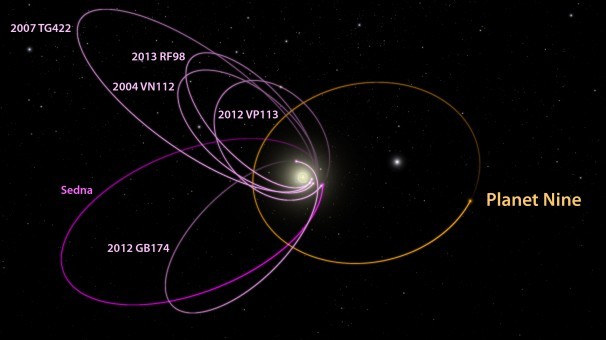

| Online: | |
| Visits: | |
| Stories: |

| Story Views | |
| Now: | |
| Last Hour: | |
| Last 24 Hours: | |
| Total: | |
A New Planet in Our Solar System According to Researchers (Video)

Researchers are now pretty certain there’s a ninth planet in the solar system.
Konstantin Batygin and Mike Brown, two CalTech scientists, say the new planet is about 10 times the mass of Earth and has an atmosphere of hydrogen and helium. Science magazine reports that the mysterious “Planet X” moves in a distant orbit beyond Neptune.
The researchers haven’t observed Planet X itself, but believe it exists because of the unique configuration of six objects when they come closest to the sun, according to Science.
The scientists say that there’s a 0.007 percent probability that the configuration is due to chance, and instead are confident it’s a ninth planet. They believe they will observe the planet with a telescope within five years, according to The Associated Press.
So where did this possible planet come from? Scientists have previously speculated that there could be a missing planet in our solar system, with some theorizing that a collision caused it to be ejected out of our system some 4 billion years ago. That collision may have been with Jupiter.
“Although we were initially quite skeptical that this planet could exist, as we continued to investigate its orbit and what it would mean for the outer solar system, we become increasingly convinced that it is out there,” Batygin said in a statement. “There is solid evidence that the solar system’s planetary census is incomplete.”
Batygin and Brown described their findings in The Astronomical Journal on Wednesday.
The discovery is also the second time that Brown has reshaped the way we think about the solar system. In 2005, he made a key discovery that led scientists to reclassify Pluto as a dwarf planet. In a statement on Wednesday, Brown — whose Twitter handle is @plutokiller — alluded to the role he played in getting Pluto declassified, noting that the new discovery was 5,000 times the mass of Pluto and was definitely a planet.
All those people who are mad that Pluto is no longer a planet can be thrilled to know that there is a real planet out there still to be found,” he said.
Source HuffPost Plus YouTUBE
Check out more contributions by Jeffery Pritchett ranging from UFO to Bigfoot to Paranormal to Prophecy
An Exclusive You Have To See: The Last Frontier of Free Press Is Here! No More Censorship, Unlike YouTube and Others!




Hopefully this puts an end to all the child minds that think they sound smart by saying ‘thousands of amateur astronomers would have already discovered all the planets, etc’.
Now the mantra is “Okay it might exist, but it’s way beyond the solar system. It won’t be back for thousands of years.”
new to us is that what they’re reporting today
We call this object Vulcan. Here is its orbital parameters:
http://www.barry.warmkessel.com/vulcanrevealed.html#5
Table 2 – Vulcan’s Orbital Parameters
Parameter Value Max. Error Min. 2 Sigma Error Forbes’(1880)
Period (years) 4969.0 +30.4/- 24.3 +/- 11.5 5000
Orbital Eccentricity 0.537 +0.088/-0.035 +/- 0.0085 not cal.
Orbital Inclination 48.44o +3.12o/-9.05o +/- 0.23o 45o
Longitude of the Ascending Node 189.0o +/- 1.3o +/- 1.3o 185o
Argument Of Perihelion 257.8o +6.11o/-13.47o +/- 0.90o not cal.
Time of Aphelion (years) 1970 AD +/- 1.0 +/- 1.0 not cal.
Table 2 shows Vulcan’s orbital parameters. Vulcan’s Aphelion is 41.6 billion miles (448 AU) vs. Hynek’s 50 billion. Forbes (1880) used comets aphelia to predict a similar orbit. Stars pass within 2000 AU of the Sun over the solar system’s life and would eject planets more distant than 47 billion miles (500 AU).
Here is verification of its orbital period.
http://www.barry.warmkessel.com/vulcanrevealed.html#8
Weather changes at nominal ten thousand year intervals induced by impacts of fragments from the A:Cl-1 and the B:Cl-1e swarms’ cluster along with the estimate of Forbe’s planet’s period and the CR105′s average orbital period offer a ways to verify Vulcan’s orbital period. These three different means using four different independent measurements can be statistically combined yielding:
Vulcan’s Combined Measured Period = 4970.70 years +/- 8.14 (one sigma) years.
Vulcan’s theoretical period obtained from the Blavatsky’s Theosophy is:
If Vulcan is at the IRAS point:
Vulcan’s Theoretical Period = 4969.0 years +/- 5.7 (one sigma) years.
If Vulcan is nearby (e.g a typo was made recording the IRAS point):
[Vulcan's Theoretical Period = 4972.0 years +/- 27.35 (one sigma) years.]
It is statistically certain that the combined measured periods is within 86.5% of Vulcan’s theoretical period if Vulcan is at the IRAS point employed, and 96.4% if it is not. Any probability > 40% means that the two physical quantities are related.
Here is how it relates to some of those minor planets. Note that Figure 9 indicates that it may be up to 80,000 miles in diameter. Our estimate is that it is about 80,691 miles in diameter.
http://www.barry.warmkessel.com/Dwarfs.html#d
A NEW GIANT PLANET IN OUR SOLAR SYSTEM? Updated 1 Aug 2014
In 1988 dr. R.S. Harrington and P.K. Seidelmann published the following articles :
https://crashrecovery.org/the-location-of-planet-x-astronomical-journal-1988-v96-no4.pdf
https://crashrecovery.org/planet-x-the-current-status-celestial-mechanics-1988-43.pdf
Harrington then dies under strange circumstances, Charles E. Worley wrote the following testimony :
https://crashrecovery.org/rsharrington.pdf
Since when did “if, but and maybe” = fact?